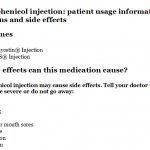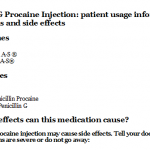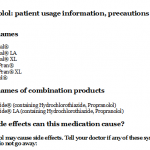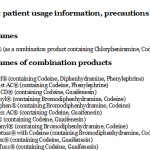
Nifedipine: patient usage information, precautions and side effects
Tuesday, May 30, 2017 by Gregory Van Dyke
http://www.naturalnewsreference.com/2017-05-30-nifedipine-patient-usage-information-precautions-and-side-effects.html

Nifedipine: patient usage information, precautions and side effects
Brand names
Adalat®
Adalat® CC
Afeditab® CR
Nifedical® XL
Nifeditab® CR
Procardia®
Procardia® XL
What should I do if I forget a dose?
Take the missed dose as soon as you remember it. However, if it is almost time for the next dose, skip the missed dose and continue your regular dosing schedule. Do not take a double dose to make up for a missed one.
What side effects can this medication cause?
Nifedipine may cause side effects. Tell your doctor if any of these symptoms are severe or do not go away:
-
headache
-
nausea
-
dizziness or lightheadedness
-
flushing
-
heartburn
-
fast heartbeat
-
muscle cramps
-
constipation
-
cough
-
decreased sexual ability
Some side effects can be serious. If you experience any of the following symptoms, call your doctor immediately or get emergency medical treatment:
-
swelling of the face, eyes, lips, tongue, hands, arms, feet, ankles, or lower legs
-
difficulty breathing or swallowing
-
fainting
-
rash
-
yellowing of the skin or eyes
-
increase in frequency or severity of chest pain (angina)
If you experience a serious side effect, you or your doctor may send a report to the Food and Drug Administration’s (FDA) MedWatch Adverse Event Reporting program online (http://www.fda.gov/Safety/MedWatch) or by phone (1-800-332-1088).
Why is this medication prescribed?
Nifedipine is used to treat high blood pressure and to control angina (chest pain). Nifedipine is in a class of medications called calcium-channel blockers. It lowers blood pressure by relaxing the blood vessels so the heart does not have to pump as hard. It controls chest pain by increasing the supply of blood and oxygen to the heart.
High blood pressure is a common condition and when not treated, can cause damage to the brain, heart, blood vessels, kidneys and other parts of the body. Damage to these organs may cause heart disease, a heart attack, heart failure, stroke, kidney failure, loss of vision, and other problems. In addition to taking medication, making lifestyle changes will also help to control your blood pressure. These changes include eating a diet that is low in fat and salt, maintaining a healthy weight, exercising at least 30 minutes most days, not smoking, and using alcohol in moderation.
How should this medicine be used?
Nifedipine comes as a capsule and an extended-release (long-acting) tablet to take by mouth. The capsule is usually taken three or four times a day. The extended-release tablet should be taken once daily on an empty stomach, either 1 hour before or 2 hours after a meal. To help you remember to take nifedipine, take it at around the same time(s) every day. Follow the directions on your prescription label carefully, and ask your doctor or pharmacist to explain any part you do not understand. Take nifedipine exactly as directed. Do not take more or less of it or take it more often than prescribed by your doctor.
Swallow the extended-release tablets whole; do not split, chew, or crush them.
Your doctor will probably start you on a low dose of nifedipine and gradually increase your dose, generally once every 7 to 14 days.
If taken regularly, nifedipine controls chest pain, but it does not stop chest pain once it starts. Your doctor may prescribe a different medication to take when you have chest pain.
Nifedipine controls high blood pressure and chest pain (angina) but does not cure them. Continue to take nifedipine even if you feel well. Do not stop taking nifedipine without talking to your doctor. Your doctor will probably decrease your dose gradually.
Other uses for this medicine
Nifedipine is also used sometimes to treat preterm labor and Raynaud’s syndrome. Talk to your doctor about the possible risks of using this medication for your condition.
This medication is sometimes prescribed for other uses; ask your doctor or pharmacist for more information.
What special precautions should I follow?
Before taking nifedipine,
-
tell your doctor and pharmacist if you are allergic to nifedipine, any other medications, or any of the ingredients in nifedipine. Ask your pharmacist for a list of the ingredients.
-
tell your doctor and pharmacist what other prescription and nonprescription medications, vitamins, nutritional supplements, you are taking or plan to take. Be sure to mention any of the following: acarbose (Precose); anticoagulants (‘blood thinners’) such as warfarin (Coumadin, Jantoven); antifungals such as fluconazole (Diflucan), itraconazole (Onmel, Sporanox), and ketoconazole (Nizoral); beta blockers such as atenolol (Tenormin), labetalol (Trandate), metoprolol (Lopressor, Toprol XL, in Dutoprol), nadolol (Corgard, in Corzide), propranolol (Inderal, Innopran, in Inderide), and timolol ); carbamazepine (Carbatrol, Epitol, Tegretol); cimetidine (Tagamet); digoxin (Lanoxin); diltiazem (Cardizem); doxazosin (Cardura); erythromycin (E.E.S., E-Mycin, Erythrocin); fentanyl (Actiq, Duragesic, Fentora); flecainide (Tambocor); HIV protease inhibitors including amprenavir (Agenerase), atazanavir (Reyataz), delavirdine (Rescriptor), fosamprenavir (Lexiva), indinavir (Crixivan), nelfinavir (Viracept), and ritonavir (Norvir, in Kaletra); metformin (Glucophage); nefazodone; phenobarbital; phenytoin (Dilantin, Phenytek); quinidine (in Nuedexta); quinupristin and dalfopristin (Synercid); rifampin (Rifadin, in Rifamate, in Rifater, Rimactane); rifapentine (Priftin); tacrolimus (Astagraf SL,Prograf); valproic acid (Depakene); and verapamil (Calan, Covera, Verelan, in Tarka). Your doctor may need to change the doses of your medications or monitor you carefully for side effects.
-
tell your doctor what herbal products you are taking, especially St. John’s wort.
-
tell your doctor if you have or have ever had a narrowing or blockage of your digestive system or any other condition that causes food to move through your digestive system more slowly; or heart, liver, or kidney disease. Also tell your doctor if you have had a myocardial infarction (MI) within the last 2 weeks.
-
tell your doctor if you are pregnant, plan to become pregnant, or are breast-feeding. If you become pregnant while taking nifedipine, call your doctor.
-
talk to your doctor about the safe use of nifedipine capsules if you are 65 years of age or older. Older adults should not usually take nifedipine capsules because they are not as safe as other medications that can be used to treat the same condition.
-
if you are having surgery, including dental surgery, tell your doctor or dentist that you are taking nifedipine.
-
ask your doctor about the safe use of alcoholic beverages while you are taking nifedipine. Alcohol can make the side effects from nifedipine worse.
What special dietary instructions should I follow?
Do not drink grapefruit juice or eat grapefruit 3 days before and while taking nifedipine.
If your doctor prescribes a low-salt or low-sodium diet, follow these directions carefully.
What should I do if I forget a dose?
Take the missed dose as soon as you remember it. However, if it is almost time for the next dose, skip the missed dose and continue your regular dosing schedule. Do not take a double dose to make up for a missed one.
What should I know about storage and disposal of this medication?
Keep this medication in the container it came in, tightly closed, and out of reach of children. Store it at room temperature, away from light, and away from excess heat and moisture (not in the bathroom). Throw away any medication that is outdated or no longer needed. Talk to your pharmacist about the proper disposal of your medication.
In case of emergency/overdose
In case of overdose, call your local poison control center at 1-800-222-1222. If the victim has collapsed or is not breathing, call local emergency services at 911.
Symptoms of overdose may include:
-
dizziness
-
fast heartbeat
-
flushing
-
nervousness
-
nausea
-
vomiting
-
swelling of the hands, feet, ankles, or lower legs
-
blurred vision
-
fainting
What other information should I know?
Keep all appointments with your doctor and the laboratory. Your blood pressure should be checked regularly to determine your response to nifedipine.
If you are taking certain extended-release tablets (Afeditab CR, Procardia XL), you may notice something that looks like a tablet in your stool. This is just the empty tablet shell, and this does not mean that you did not get your complete dose of medication.
Do not let anyone else take your medication. Ask your pharmacist any questions you have about refilling your prescription.
It is important for you to keep a written list of all of the prescription and nonprescription (over-the-counter) medicines you are taking, as well as any products such as vitamins, minerals, or other dietary supplements. You should bring this list with you each time you visit a doctor or if you are admitted to a hospital. It is also important information to carry with you in case of emergencies.
Why is this medication prescribed?
How should this medicine be used?
What special precautions should I follow?
What special dietary instructions should I follow?
What should I do if I forget a dose?
What side effects can this medication cause?
What should I know about storage and disposal of this medication?
Tagged Under: Tags: chemical medicine, medication, Pharma, Prescription Medicine





